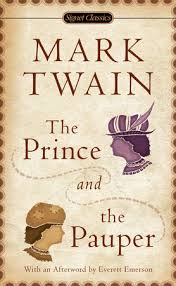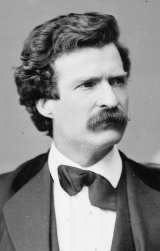The Prince and the Pauper Page #7
The Prince and the Pauper is a novel by American author Mark Twain. It was first published in 1881 in Canada, before its 1882 publication in the United States. The novel represents Twain's first attempt at historical fiction.
His spirits sank lower and lower as he moved between the glittering files of bowing courtiers; for he recognised that he was indeed a captive now, and might remain for ever shut up in this gilded cage, a forlorn and friendless prince, except God in his mercy take pity on him and set him free. And, turn where he would, he seemed to see floating in the air the severed head and the remembered face of the great Duke of Norfolk, the eyes fixed on him reproachfully. His old dreams had been so pleasant; but this reality was so dreary! CHAPTER VI. Tom receives instructions. Tom was conducted to the principal apartment of a noble suite, and made to sit down--a thing which he was loth to do, since there were elderly men and men of high degree about him. He begged them to be seated also, but they only bowed their thanks or murmured them, and remained standing. He would have insisted, but his ‘uncle’ the Earl of Hertford whispered in his ear-- “Prithee, insist not, my lord; it is not meet that they sit in thy presence.” The Lord St. John was announced, and after making obeisance to Tom, he said-- “I come upon the King’s errand, concerning a matter which requireth privacy. Will it please your royal highness to dismiss all that attend you here, save my lord the Earl of Hertford?” Observing that Tom did not seem to know how to proceed, Hertford whispered him to make a sign with his hand, and not trouble himself to speak unless he chose. When the waiting gentlemen had retired, Lord St. John said-- “His majesty commandeth, that for due and weighty reasons of state, the prince’s grace shall hide his infirmity in all ways that be within his power, till it be passed and he be as he was before. To wit, that he shall deny to none that he is the true prince, and heir to England’s greatness; that he shall uphold his princely dignity, and shall receive, without word or sign of protest, that reverence and observance which unto it do appertain of right and ancient usage; that he shall cease to speak to any of that lowly birth and life his malady hath conjured out of the unwholesome imaginings of o’er-wrought fancy; that he shall strive with diligence to bring unto his memory again those faces which he was wont to know--and where he faileth he shall hold his peace, neither betraying by semblance of surprise or other sign that he hath forgot; that upon occasions of state, whensoever any matter shall perplex him as to the thing he should do or the utterance he should make, he shall show nought of unrest to the curious that look on, but take advice in that matter of the Lord Hertford, or my humble self, which are commanded of the King to be upon this service and close at call, till this commandment be dissolved. Thus saith the King’s majesty, who sendeth greeting to your royal highness, and prayeth that God will of His mercy quickly heal you and have you now and ever in His holy keeping.” The Lord St. John made reverence and stood aside. Tom replied resignedly-- “The King hath said it. None may palter with the King’s command, or fit it to his ease, where it doth chafe, with deft evasions. The King shall be obeyed.” Lord Hertford said-- “Touching the King’s majesty’s ordainment concerning books and such like serious matters, it may peradventure please your highness to ease your time with lightsome entertainment, lest you go wearied to the banquet and suffer harm thereby.” Tom’s face showed inquiring surprise; and a blush followed when he saw Lord St. John’s eyes bent sorrowfully upon him. His lordship said-- “Thy memory still wrongeth thee, and thou hast shown surprise--but suffer it not to trouble thee, for ’tis a matter that will not bide, but depart with thy mending malady. My Lord of Hertford speaketh of the city’s banquet which the King’s majesty did promise, some two months flown, your highness should attend. Thou recallest it now?” “It grieves me to confess it had indeed escaped me,” said Tom, in a hesitating voice; and blushed again. At this moment the Lady Elizabeth and the Lady Jane Grey were announced. The two lords exchanged significant glances, and Hertford stepped quickly toward the door. As the young girls passed him, he said in a low voice-- “I pray ye, ladies, seem not to observe his humours, nor show surprise when his memory doth lapse--it will grieve you to note how it doth stick at every trifle.” Meantime Lord St. John was saying in Tom’s ear-- “Please you, sir, keep diligently in mind his majesty’s desire. Remember all thou canst--seem to remember all else. Let them not perceive that thou art much changed from thy wont, for thou knowest how tenderly thy old play-fellows bear thee in their hearts and how ’twould grieve them. Art willing, sir, that I remain?--and thine uncle?” Tom signified assent with a gesture and a murmured word, for he was already learning, and in his simple heart was resolved to acquit himself as best he might, according to the King’s command. In spite of every precaution, the conversation among the young people became a little embarrassing at times. More than once, in truth, Tom was near to breaking down and confessing himself unequal to his tremendous part; but the tact of the Princess Elizabeth saved him, or a word from one or the other of the vigilant lords, thrown in apparently by chance, had the same happy effect. Once the little Lady Jane turned to Tom and dismayed him with this question,-- “Hast paid thy duty to the Queen’s majesty to-day, my lord?” Tom hesitated, looked distressed, and was about to stammer out something at hazard, when Lord St. John took the word and answered for him with the easy grace of a courtier accustomed to encounter delicate difficulties and to be ready for them-- “He hath indeed, madam, and she did greatly hearten him, as touching his majesty’s condition; is it not so, your highness?” Tom mumbled something that stood for assent, but felt that he was getting upon dangerous ground. Somewhat later it was mentioned that Tom was to study no more at present, whereupon her little ladyship exclaimed-- “‘Tis a pity, ’tis a pity! Thou wert proceeding bravely. But bide thy time in patience: it will not be for long. Thou’lt yet be graced with learning like thy father, and make thy tongue master of as many languages as his, good my prince.” “My father!” cried Tom, off his guard for the moment. “I trow he cannot speak his own so that any but the swine that kennel in the styes may tell his meaning; and as for learning of any sort soever--” He looked up and encountered a solemn warning in my Lord St. John’s eyes. He stopped, blushed, then continued low and sadly: “Ah, my malady persecuteth me again, and my mind wandereth. I meant the King’s grace no irreverence.” “We know it, sir,” said the Princess Elizabeth, taking her ‘brother’s’ hand between her two palms, respectfully but caressingly; “trouble not thyself as to that. The fault is none of thine, but thy distemper’s.”
Translation
Translate and read this book in other languages:
Select another language:
- - Select -
- 简体中文 (Chinese - Simplified)
- 繁體中文 (Chinese - Traditional)
- Español (Spanish)
- Esperanto (Esperanto)
- 日本語 (Japanese)
- Português (Portuguese)
- Deutsch (German)
- العربية (Arabic)
- Français (French)
- Русский (Russian)
- ಕನ್ನಡ (Kannada)
- 한국어 (Korean)
- עברית (Hebrew)
- Gaeilge (Irish)
- Українська (Ukrainian)
- اردو (Urdu)
- Magyar (Hungarian)
- मानक हिन्दी (Hindi)
- Indonesia (Indonesian)
- Italiano (Italian)
- தமிழ் (Tamil)
- Türkçe (Turkish)
- తెలుగు (Telugu)
- ภาษาไทย (Thai)
- Tiếng Việt (Vietnamese)
- Čeština (Czech)
- Polski (Polish)
- Bahasa Indonesia (Indonesian)
- Românește (Romanian)
- Nederlands (Dutch)
- Ελληνικά (Greek)
- Latinum (Latin)
- Svenska (Swedish)
- Dansk (Danish)
- Suomi (Finnish)
- فارسی (Persian)
- ייִדיש (Yiddish)
- հայերեն (Armenian)
- Norsk (Norwegian)
- English (English)
Citation
Use the citation below to add this book to your bibliography:
Style:MLAChicagoAPA
"The Prince and the Pauper Books." Literature.com. STANDS4 LLC, 2025. Web. 5 Feb. 2025. <https://www.literature.com/book/the_prince_and_the_pauper_315>.








Discuss this The Prince and the Pauper book with the community:
Report Comment
We're doing our best to make sure our content is useful, accurate and safe.
If by any chance you spot an inappropriate comment while navigating through our website please use this form to let us know, and we'll take care of it shortly.
Attachment
You need to be logged in to favorite.
Log In